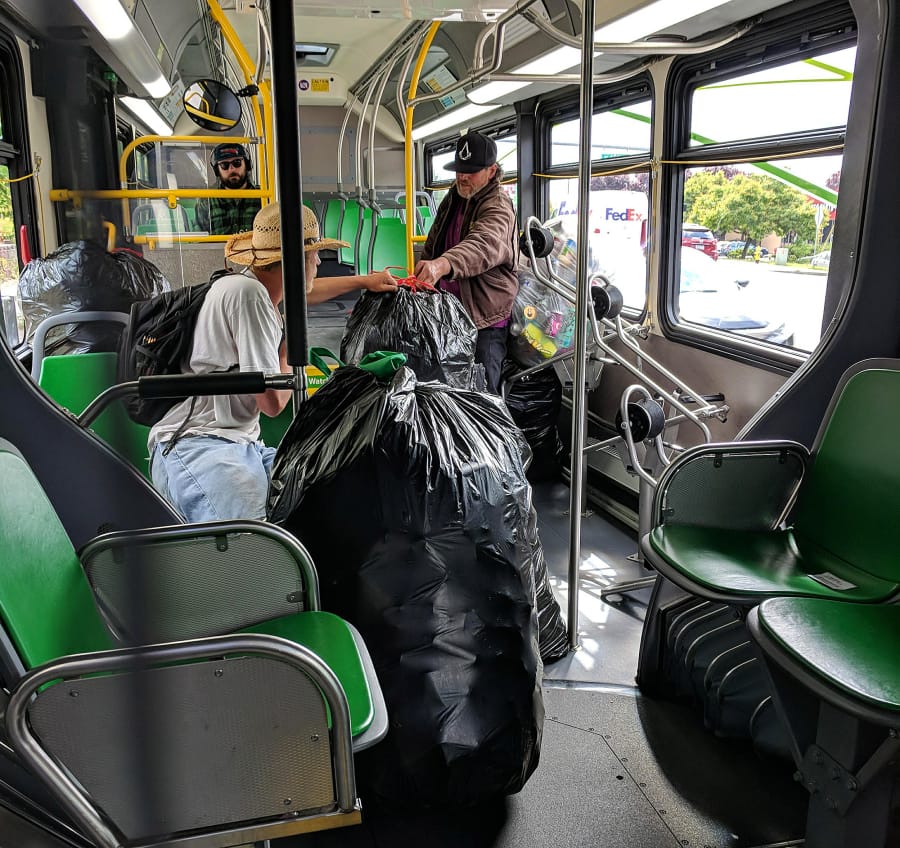C-Tran is enacting a policy to stop passengers from carrying empty cans and bottles on its buses.
The agency says it isn’t targeting people holding an empty container in their hand, or at low-income or homeless people — who presumably redeem the cans and bottles for cash in Oregon. Instead, the new policy is aimed at combating sanitation and safety issues created by passengers carrying large bags full of empties onboard and setting them in the aisle or on seats.
“A lot of passengers view it as an inconvenience. We view it as a possible safety issue and a definite hygienic issue,” said C-Tran spokeswoman Christine Selk. “Everyone’s paying a fare and we need to be respectful of people and their safety. Big bags of cans can leave a mess and possibly create safety situations; and bags can leave big wet spots on seats and people sit in them.”
Plus, the liquid that can drain out of the bags leaves residue and a lingering odor.
The agency’s rules for riding now stipulate “riders may no longer bring empty cans and bottles onto C-Tran buses due to continued sanitation and safety concerns” as of Sunday.
That is in addition to an existing rule that says doorways and aisles must always be kept clear.
C-Tran CEO Shawn Donaghy announced the policy change near the end of the agency’s board of directors meeting on Aug. 14.
While there are no specifics about the quantity of cans or bottles, Selk said bus drivers will enforce the rule with a “common-sense approach.”
The agency has tried in the past to limit cans. Prior to the new rules, C-Tran had a two-bag limit in place, but the issue and complaints persisted.
Selk said there wasn’t a specific number of complaints that spurred the change.
“It causes sanitary and safety issues, so we think that’s enough,” she said, adding, “this is not an attack on the homeless.”
But homeless advocates aren’t so sure.
Kate Budd, executive director of Council for the Homeless, is unsure how many homeless people return cans to Oregon for cash and how many may be disproportionately impacted by the rule change.
“We are watching this closely and talking with people who live on the street to see if there are any ill effects from this policy,” Budd said. “To make a rule like this that is so targeted and specific is surprising.”
Under Oregon’s bottle bill, beverage cans and bottles can be exchanged for a dime, including cans brought from Washington so long as they were bought in Oregon. The practice is not just used by people without homes, but also low-income people who are trying to make ends meet.
“When people are thinking of creative ways to earn money, returning bottles and donating plasma are two quick ways to make a few dollars,” Budd said. “We’re just simply concerned when the rights of someone who is simply trying to earn some money to survive and do what they wish to do on a daily basis are being inhibited.”
She said that people travel to Oregon’s redemption centers by bus, bike or on foot, or maybe lug a cart carrying the recyclables.
The Safeway supermarket at Jantzen Beach closed in June, making the trek to redeem bottles longer. Now the closest location to Vancouver is the BottleDrop on North Hayden Meadows Drive at Delta Park. In the first quarter of 2018, 13.9 million cans and bottles were redeemed there — the second-most of any BottleDrop in the state.
The closest C-Tran route to the BottleDrop is Route 60, which runs from downtown Vancouver to the Delta Park/Vanport Max Station.
Oregon created the Bottle Bill system in 1971 to reduce litter and increase recycling. The Oregon Legislature passed a bill in 2011 that increased the deposit if the recycling rate fell below 80 percent for two consecutive years.
After several under-performing years, the redemption rate rose in 2017 from 5 cents to 10 cents per container. As a result, BottleDrop saw 231 million more containers returned in 2017 compared with 2016, according to the Oregon Beverage Recycling Cooperative.
This year, the bill expanded to include most beverages sold in bottles and cans from 4 ounces to 1.5 liters.
Joe Gilliam, president of the Northwest Grocery Association, said redemption rates are up — typically hovering at more than 90 percent. However, the issues of fraud that he predicted would be exacerbated by the deposit increase have seemingly come to fruition.
“In some places near borders it was over 100 percent,” he said. “Anywhere there’s a bridge and a border we see that kind of over-redemption.”
Portland’s homelessness crisis “is a perfect storm” as people without homes use the bottle deposit system for income. Out-of-state redemptions don’t just occur in the Portland metro area, Gilliam said, but also in Oregon border cities such as The Dalles, Hood River, Astoria, Ontario and Milton-Freewater.
Although grocery store and BottleDrop staff can ask for receipts proving the beverages were purchased in Oregon, Gilliam said, “it’s not very practical.”
Matthew Van Sickle, spokesman for the Oregon Liquor Control Commission, said any retailer taking back these products for redemption has a right to not pay the redemption if they have reason to believe the containers are from out of state. Fraudulently redeeming out-of-state products currently carries no penalty, he said in an email, but the Oregon Legislature could change that if it wanted to.
Tia York, TriMet’s public information officer, acknowledged that Oregon’s recycling rebates can provide some level of income for someone who is struggling financially, and TriMet riders have largely done the same.
“We have received a small number of complaints from riders regarding bags of bottles and cans on board, but more so, we’ve heard support of TriMet allowing them, as they may be the individual’s only source of income,” she said.
TriMet doesn’t have a policy that bans bags of cans and/or bottles on its buses or MAX or WES trains.
It does have a policy prohibiting riders from loading empty seats with personal items or blocking aisles or doors with any type of bag — regardless of what’s inside.





